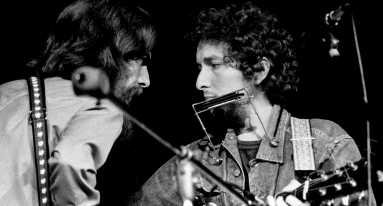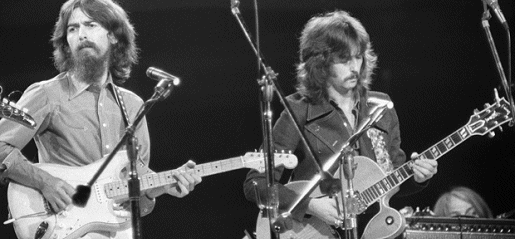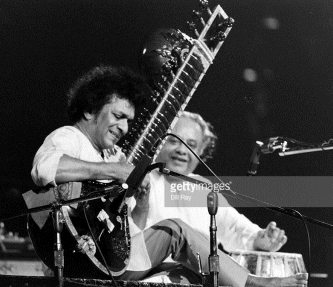Sixties
City presents
a wide-ranging series of
articles on all aspects of the Sixties, penned by the creator of the iconic
60s music paper Mersey
Beat
|
Sixties
City presents
a wide-ranging series of
articles on all aspects of the Sixties, penned by the creator of the iconic
60s music paper Mersey
Beat
|
|||||
|
 |
In March
1971, following political problems and strife between the various regions
in Bangladesh, in the eastern half of Pakistan, Pakistan's ruling General
sent in the army to deal with any opposition. Then, in December 1971, a
cyclone swept across the region, causing immense devastation. There was
a complete breakdown throughout the country with no clean water, no food,
no adequate shelter and, in addition to the fear of military suppression,
there was hunger and disease rife in the country. Ravi Shankar had family and friends in Bangladesh and was aware of the intense suffering of the people there. In June 1971, while in Los Angeles, he decided to try to raise some money, perhaps a few thousand dollars, to help the people of Bangladesh. At the time he was completing the film 'Messenger From The East' with George Harrison and he asked George if he would help with a benefit show, perhaps acting as a compere for the night. Ravi gave George some magazines with articles about the famine and George decided that a small-scale concert wasn't good enough. As he was to remark later, "The Beatles had been trained to the view that if you're going to do it, you might as well do it big". George approached Allen Klein and instructed him to book the 20,000-seater Madison Square Garden in New York. As soon as news of the concert was announced the seats sold out and a further show was arranged for the same night, Sunday August 1st, which also sold out almost immediately. Both shows had sold out within six hours. George also contacted Apple's A&R head Phil Spector with instructions to record the concert and he approached Apple Films to document the event. A number of George's immediate musician friends became involved - Badfinger, Billy Preston, Jesse Ed Davis, Carl Radle, Klaus Voormann and Jim Keltner. The most obvious musicians who would attract the most spectacular publicity were clearly the members of the ex-Beatles. Realising that there could be no agreement for the four Beatles to perform together again as The Beatles due to the court case which Paul had brought to dissolve the group, George believed that they could still appear, performing individual solo spots. He immediately contacted Ringo who took time off from filming the Western 'Blindman' to travel to New York for rehearsals. |
|
John and Yoko had been planning to travel to New York to complete their
recording of an album in July, so John agreed to appear. Even Paul gave
a tentative approval of the project and seemed willing to appear. However,
it seems that he wanted some of the different business difficulties resolved
first, which couldn't be done at the time, so he pulled out. When John arrived with the omnipresent Yoko, George had to explain that he only wanted John to appear on the show and not Yoko. She was furious and created such a violent argument that John's glasses were broken. John was so upset he immediately left and took the first plane to Europe, ending up in Paris! It's a pity that posterity was denied John's appearance at this highly important concert due to Yoko's determination to cling like a limpet to everything John did, proving that he was unable to carry on a solo career like the other ex-members as Yoko insisted on being involved in all his records and concerts. Leon Russell agreed to appear - as did Bob Dylan. Dylan's appearance was kept secret until he actually walked on stage, which created an absolute sensation, as everyone had believed he'd retired from the music scene. This coup hadn't been easy for George to arrange as Dylan had been missing rehearsals, then phoning George to say he couldn't handle the pressure and wouldn't appear after all. George also had difficulties regarding Eric Clapton's participation. Like Dylan, Clapton hadn't made any appearances for a year and he was hooked on drugs. In fact, as soon as he arrived in New York he sent his girlfriend Alice Ormsby-Gore out onto the streets to score some heroin for him. He was so ill he was unable to attend rehearsals the night before the concert and Jesse Ed Davis was on stand-by as his replacement. Fortunately, both Dylan (George was on tenterhooks because even at the start of the concert he wasn't sure whether Dylan would turn up) and Clapton (who had treatment by Doctor William Zahm earlier that day) were able to perform. The concert began with George introducing Ravi Shankar for a set of Indian music. Ravi played sitar and his other musicians were Ali Akbar Khan on sarod, Alla Rakha on tabla and Kamala Chakravarty on tamboura. The next to appear was George, who opened his set with 'Wah-Wah'. |
 |
 |
His backing musicians were Eric Clapton on guitar, Ringo
Starr and Jim Keltner on drums, Leon Russell on piano, Billy Preston on
keyboards, Jesse Ed Davis on electric guitar, Jim Horn leading a brass section,
Klaus Voormann on bass, Claudia Linnear leading a nine-piece Gospel choral
and three members of Badfinger on acoustic guitars. They performed 'My Sweet
Lord', 'Awaiting On You All', 'Beware Of Darkness', 'That's The Way God
Planned It' (a Billy Preston showpiece), 'It Don't Come Easy' (a Ringo Starr
showpiece), 'While My Guitar Gently Weeps' (with Eric Clapton's classic
solo), 'Something' and 'Here Comes The Sun'. George then introduced Dylan, saying "I'd like to bring on a friend of us all - Mister Bob Dylan". A bearded Dylan, dressed in denim jacket and jeans opened with 'A Hard Rain's Gonna Fall'. He next performed 'Mr Tambourine Man', 'Blowin' In The Wind', 'It Takes A Lot To Laugh, It Takes A Train To Cry' and 'Just Like A Woman'. On the last number he was joined by George on guitar, Ringo on tambourine and Leon Russell on bass. Following the two shows there was a celebration party. The following morning, when George read the positive reviews in the local papers, he sat down and wrote the song 'The Day The World Gets Round'. The full listing of artists was: Rock: George Harrison, Eric Clapton, Jesse Ed Davis and Don Preston on guitars; Pete Ham, Tom Evans and Joey Molland of Badfinger on acoustic guitars; Mike Gibbins of Badfinger on percussion; Billy Preston on organ; Leon Russell on piano and bass; Carl Radle and Klaus Voormann on bass; Ringo Starr on drums and tambourine; Jim Keltner on drums; Bob Dylan on harmonica and acoustic guitar; Jim Horn, Chuck Findley and Ollie Mitchell on horns; George Harrison, Billy Preston, Ringo Starr, Leon Russell, Don Preston and Bob Dylan on vocals; Alan Beutler, Marlin Green, Jeanie Green, Jo Green, Dolores Hall, Jackie Kelso, Claudia Linnear, Lou McCreary and Don Nix on backing vocals. Indian music: Ravi Shankar on sitar; Ali Akbar Khan on sarod; Alla Rakah on tabla and Kamala Chakravarty on tamboura. A particularly disappointing aspect was that although all the artists were donating their services to aid the poor and starving people of Bangladesh, the tax inspectors of both Britain and America wanted their pound of flesh. They demanded the full tax from all the proceedings, uninterested in the fact that this was literally taking the food out of the mouths of a starved and battered people. The idealistic George was disillusioned by this intransigence from the tax authorities, but he signed a personal cheque to cover the demands. The concert itself brought in a quarter of a million dollars and the album and film generated millions, yet there seemed to be some problems regarding these funds. An article in New York magazine implied that Allen Klein had absconded with some of the money and Klein responded with a multi-million dollar lawsuit, which he then dropped. |
|
Article
Text
UK
web hosting by
|